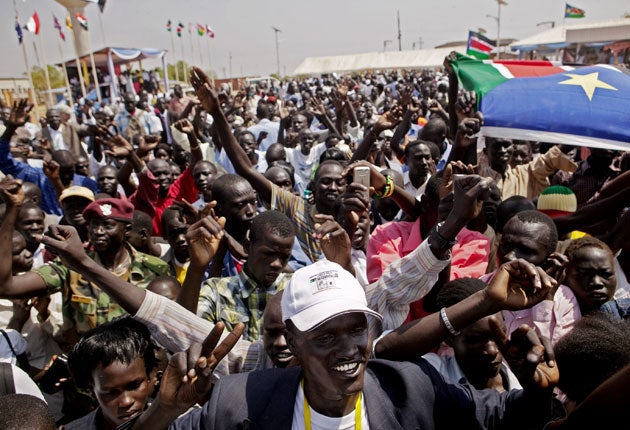Landslide vote in favour of secession rocks Khartoum

Your support helps us to tell the story
From reproductive rights to climate change to Big Tech, The Independent is on the ground when the story is developing. Whether it's investigating the financials of Elon Musk's pro-Trump PAC or producing our latest documentary, 'The A Word', which shines a light on the American women fighting for reproductive rights, we know how important it is to parse out the facts from the messaging.
At such a critical moment in US history, we need reporters on the ground. Your donation allows us to keep sending journalists to speak to both sides of the story.
The Independent is trusted by Americans across the entire political spectrum. And unlike many other quality news outlets, we choose not to lock Americans out of our reporting and analysis with paywalls. We believe quality journalism should be available to everyone, paid for by those who can afford it.
Your support makes all the difference.The reality of two Sudans was hammered home yesterday as southerners celebrated a near total vote for secession, while riot police battled protesters in Khartoum demanding that the northern government resign.
The official results of the referendum showed an incredible 99 per cent of southerners had voted against unity, giving rise to what will be Africa's newest nation. Meanwhile, the Arab orientation of the diminished northern Sudan was underlined by Egypt- and Tunisia-style demonstrations in the capital calling for regime change.
The cheering on the streets of Juba, the capital-in-waiting of the soon to be independent state, contrasted sharply with the beatings and arrests in Khartoum where the government of Omar al-Bashir faces a struggle to stay in power.
While the verdict of southern Sudanese voters has been in little doubt since last month's poll, the emphatic nature of the divorce was still extraordinary. Justice Chan Reec Maduth from the referendum commission announced that across the south, 99 per cent of registered voters had turned out and that 99 per cent of them had voted for secession.
The world's newest country will not formally arrive for another six months as complex negotiations ensue to decide the terms of the historic divorce. The division of Sudan's main export earner: oil, is one of dozens of potential areas of conflict, along with borders, foreign debt and disputed enclaves.
Mohamed Ibrahim Khalil, the head of the referendum bureau in the north, where 58 per cent of southerners voted for a split, said the verdict changed only the "constitutional relationship" between the countries. "The north and south are drawn together in indissoluble geographic and historic bonds," he said.
Salva Kiir, the Southern Sudanese president, maintained his diplomatic stance towards Khartoum and thanked his northern counterpart for "making peace possible".
Mr Bashir, who has been indicted by the International Criminal Court for war crimes, faces a growing challenge to his authority from opposition groups inspired by events in Cairo and Tunis.
Violent clashes broke out at two Khartoum universities yesterday as heavily armed police surrounded stone throwing students. Social media groups similar to those used elsewhere in the Arab world to mobilise protesters have started to mushroom in northern cities.
One of them calling itself "Youth for Change" has attracted 15,000 members to its Facebook page. "The people of Sudan will not remain silent anymore," it says. "It is about time we demand our rights and take what's ours in a peaceful demonstration that will not involve any acts of sabotage."
Security forces arrested Hussein Khogali, the editor of al-Watan newspaper, whom they accuse of orchestrating the online protests.
Join our commenting forum
Join thought-provoking conversations, follow other Independent readers and see their replies
Comments